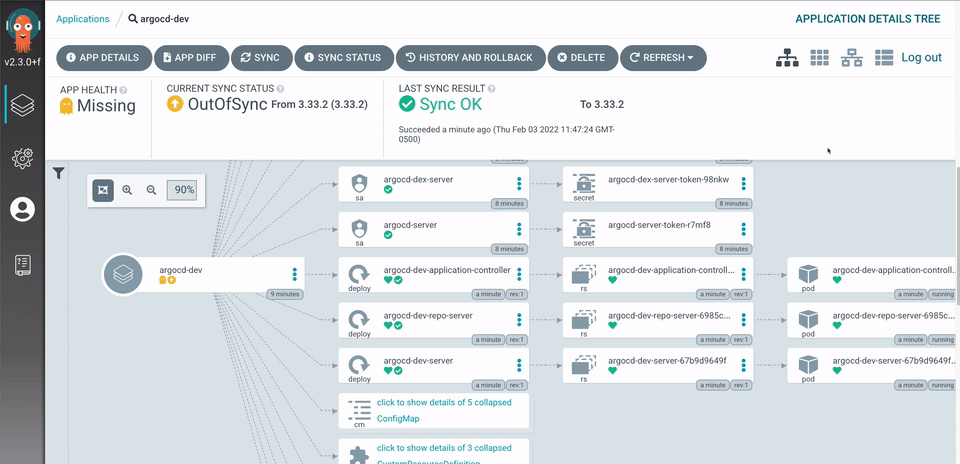.
Argo CD

Declarative, GitOps continuous delivery for Kubernetes
🚀 Why Argo CD?
Application definitions, configurations, and environments should be declarative and version controlled. Application deployment and lifecycle management should be automated, auditable, and easy to understand.

Argo CD user interface showing application deployments
🔄 How It Works
Argo CD follows the GitOps pattern of using Git repositories as the source of truth for defining the desired application state. Kubernetes manifests can be specified in several ways:
- Kustomize applications
- Helm charts
- Jsonnet files
- Plain directory of YAML/JSON manifests
- Any custom config management tool configured as a config management plugin
Argo CD automates the deployment of the desired application states in the specified target environments. Application deployments can track updates to branches, tags, or be pinned to a specific version of manifests at a Git commit. See tracking strategies for additional details about the different tracking strategies available.
📋 Provision
vagrant up --provision-with basetools,docsify,docker,minikube,argocddocker compose exec hashiqube /bin/bash
bash hashiqube/basetools.sh
bash docker/docker.sh
bash docsify/docsify.sh
bash minikube/minikube.sh
bash argocd/argocd.sh🛠️ Provisioner Script
The following script automates the Argo CD deployment on Minikube:
#!/bin/bash
# https://argo-cd.readthedocs.io/en/stable/operator-manual/installation/
# https://devopscube.com/setup-argo-cd-using-helm/
arch=$(lscpu | grep "Architecture" | awk '{print $NF}')
if [[ $arch == x86_64* ]]; then
ARCH="amd64"
elif [[ $arch == aarch64 ]]; then
ARCH="arm64"
fi
echo -e '\e[38;5;198m'"CPU is $ARCH"
echo -e '\e[38;5;198m'"++++ "
echo -e '\e[38;5;198m'"++++ Ensure Docker Daemon is running (Dependency)"
echo -e '\e[38;5;198m'"++++ "
if pgrep -x "dockerd" >/dev/null
then
echo -e '\e[38;5;198m'"++++ Docker is running"
else
echo -e '\e[38;5;198m'"++++ Ensure Docker is running.."
sudo bash /vagrant/docker/docker.sh
fi
echo -e '\e[38;5;198m'"++++ "
echo -e '\e[38;5;198m'"++++ Ensure Minikube is running (Dependency)"
echo -e '\e[38;5;198m'"++++ "
if pgrep -x "minikube" >/dev/null
then
echo "Minikube is running"
else
echo -e '\e[38;5;198m'"Minikube is not running, launching"
sudo bash /vagrant/minikube/minikube.sh
fi
echo -e '\e[38;5;198m'"++++ "
echo -e '\e[38;5;198m'"++++ Create Argocd Namespace"
echo -e '\e[38;5;198m'"++++ "
sudo --preserve-env=PATH -u vagrant kubectl create namespace argocd
echo -e '\e[38;5;198m'"++++ "
echo -e '\e[38;5;198m'"++++ Install Argocd using kubectl"
echo -e '\e[38;5;198m'"++++ "
sudo --preserve-env=PATH -u vagrant kubectl apply -n argocd -f https://raw.githubusercontent.com/argoproj/argo-cd/stable/manifests/install.yaml
attempts=0
max_attempts=20
while ! ( sudo --preserve-env=PATH -u vagrant kubectl get pods --namespace argocd | grep argocd-server | tr -s " " | cut -d " " -f3 | grep Running ) && (( $attempts < $max_attempts )); do
attempts=$((attempts+1))
sleep 60;
echo -e '\e[38;5;198m'"++++ "
echo -e '\e[38;5;198m'"++++ Waiting for Argocd Server to become available, (${attempts}/${max_attempts}) sleep 60s"
echo -e '\e[38;5;198m'"++++ "
sudo --preserve-env=PATH -u vagrant kubectl get po,svc --namespace argocd
sudo --preserve-env=PATH -u vagrant kubectl get events | grep -e Memory -e OOM
done
echo -e '\e[38;5;198m'"++++ "
echo -e '\e[38;5;198m'"++++ Change the argocd-server service type to NodePort"
echo -e '\e[38;5;198m'"++++ "
sudo --preserve-env=PATH -u vagrant kubectl patch svc argocd-server -n argocd -p '{"spec": {"type": "NodePort"}}'
echo -e '\e[38;5;198m'"++++ "
echo -e '\e[38;5;198m'"++++ Get argocd-initial-admin-secret"
echo -e '\e[38;5;198m'"++++ "
export ARGOCD_PASSWORD=$(sudo --preserve-env=PATH -u vagrant kubectl -n argocd get secret argocd-initial-admin-secret -o jsonpath='{.data.password}' | base64 -d)
echo -e '\e[38;5;198m'"++++ Argocd Admin Password: $ARGOCD_PASSWORD"
echo -e '\e[38;5;198m'"++++ "
echo -e '\e[38;5;198m'"++++ kubectl port-forward -n argocd service/argocd-server 18043:80 --address=\"0.0.0.0\""
echo -e '\e[38;5;198m'"++++ "
attempts=0
max_attempts=20
while ! ( sudo netstat -nlp | grep "0.0.0.0:18043" ) && (( $attempts < $max_attempts )); do
attempts=$((attempts+1))
sleep 60;
echo -e '\e[38;5;198m'"++++ "
echo -e '\e[38;5;198m'"++++ kubectl port-forward -n argocd service/argocd-server 18043:80 --address=\"0.0.0.0\", (${attempts}/${max_attempts}) sleep 60s"
echo -e '\e[38;5;198m'"++++ "
sudo --preserve-env=PATH -u vagrant kubectl port-forward -n argocd service/argocd-server 18043:80 --address="0.0.0.0" > /dev/null 2>&1 &
done
echo -e '\e[38;5;198m'"++++ "
echo -e '\e[38;5;198m'"++++ Access Argocd"
echo -e '\e[38;5;198m'"++++ "
echo -e '\e[38;5;198m'"++++ Argocd Server started at http://localhost:18043"
echo -e '\e[38;5;198m'"++++ Login with admin:$ARGOCD_PASSWORD"
echo -e '\e[38;5;198m'"++++ Argocd Documentation http://localhost:3333/#/argocd/README?id=argocd"
# TODO: read token and test login
# boundary authenticate password -login-name=admin -password password -auth-method-id=ampw_1234567890 -addr=http://127.0.0.1:9200
🔗 Additional Resources
- Argo CD Official Documentation
- DevOpsCube: Setup Argo CD Using Helm
- Argo CD Best Practices
- GitOps with Argo CD
🚪 Access Information
After provisioning, you can access Argo CD at:
- URL: http://localhost:30080
- Username: admin
- Password: Retrieve using the command below:
minikube kubectl -- get secret argocd-initial-admin-secret -n argocd -o jsonpath="{.data.password}" | base64 -d📚 Key Features
- Automated deployment of applications to specified target environments
- Multiple config management tools support (Kustomize, Helm, Jsonnet, etc.)
- Webhooks integration for automated GitOps workflows
- Web UI for application management and visualization
- Application health status analysis
- SSO Integration with OIDC, OAuth2, LDAP, SAML 2.0, GitHub, GitLab, Microsoft, LinkedIn
- Webhook integrations (GitHub, BitBucket, GitLab)
- PreSync, Sync, PostSync hooks for complex application rollouts
- Prometheus metrics for monitoring




